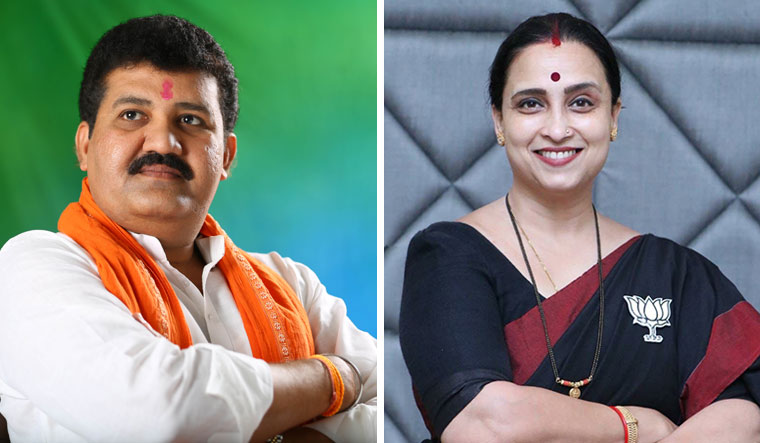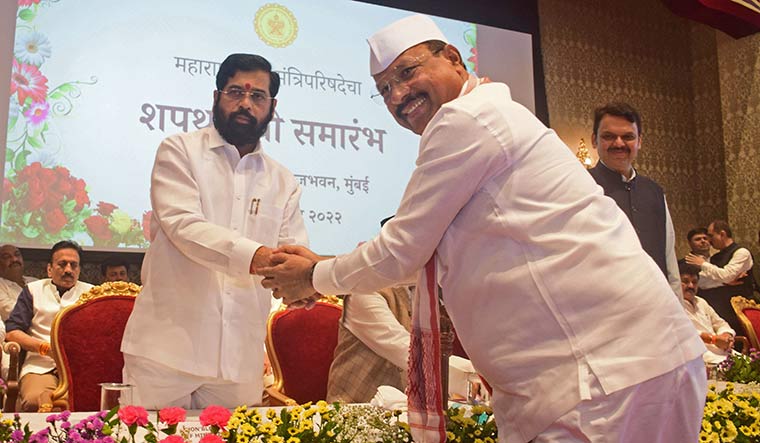CHIEF MINISTER EKNATH SHINDE must have realised that helming the coalition government in Maharashtra is not going to be an easy task after the cabinet expansion on August 9 and portfolio allocation five days later. His decision to induct Sanjay Rathod and Abdul Sattar—former ministers and influential members of the Shiv Sena faction loyal to him—into the cabinet attracted widespread criticism almost immediately. Harsh words came not just from Uddhav Thackeray’s Shiv Sena, the Congress and the Nationalist Congress Party (NCP), but also from a section of his own ally, the BJP. Sattar and Rathod were among the 18 legislators who got ministerial berths, which were distributed equally between the two alliance partners.
Sattar and Rathod were ministers in the previous Maha Vikas Aghadi (MVA) government as well. Rathod was shown the door in February last year following the mysterious death of Pooja Chavan, a 22-year-old student from Pune. BJP state vice president Chitra Wagh, who carried out a relentless campaign demanding justice for Pooja, alleged that Rathod was involved. Deputy Chief Minister Devendra Fadnavis, who was then opposition leader, had strongly backed Wagh. So it was natural that she was upset at Rathod’s inclusion in the Shinde cabinet.
Sattar, who is the Shiv Sena’s lone Muslim MLA, got into trouble when it came to light that his daughter benefited from the teachers eligibility test scam and was declared qualified despite having failed the test. The scam is now being probed by the Enforcement Directorate. Uddhav’s Shiv Sena has alleged that Sattar misused his position as a minister in the MVA government.
The BJP was reportedly not in favour of inducting Rathod and Sattar. Shinde, however, argued that the police had given Rathod the clean chit and that the allegations against Sattar were politically motivated. He is also learnt to have pointed out that the BJP had nominated Vijaykumar Gavit, former NCP minister who was accused of corruption during his tenure as tribal development minister between 2004 and 2009. Gavit joined the BJP in 2014 and his daughter, Heena, is party MP from Nandurbar. Wagh, however, is in no mood to relent. “I have not seen any clean chit by any agency or court,” she said. “My fight against Rathod will continue in court.”
According to a former BJP minister, Sattar put immense pressure on Shinde and got his name included at 3am on the day of cabinet expansion. Shinde must have realised that if Sattar could ditch Uddhav, he could very well leave him, too, perhaps with a few other disgruntled MLAs.
Another senior BJP leader said the decision to accommodate tainted leaders was the result of coalition compulsions. “Both Sattar and Rathod are powerful leaders in the Marathwada region. Rathod enjoys the support of the Banjara community. Just like we were forced to include Gavit to strengthen our base among tribal communities, the inclusion of Sattar and Rathod was Shinde’s compulsion,” he said.
Shinde, meanwhile, has left out all independent MLAs—those from his camp and also those close to the BJP. Even Bachchu Kadu, who was a minister in the MVA government, was not included. A visibly upset Kadu told journalists that he had offered Shinde issue-based support, but that was not to be taken for granted. He met the chief minister and expressed his displeasure.
Barring independents, all MVA ministers who switched to the Shinde camp found a place in the cabinet. These include Gulabarao Patil, Dada Bhuse, Shambhuraj Desai, Sandipan Bhumre and Uday Samant, along with Rathod and Sattar. The new additions from the Shinde group include Deepak Kesarkar and Tanaji Sawant.
Surprisingly, none of the Shinde group MLAs from Mumbai—Sada Sarvankar, Prakash Surve, Mangesh Kudalkar, Dilip Lande and Yamini Jadhav—were included. Shinde may have to induct one of them soon to strengthen his hold over Sena units in Mumbai, which, so far, have remained loyal to Uddhav.
The newly-inducted BJP ministers include Radhakrishna Vikhe-Patil, Sudhir Mungantiwar, Chandrakant Patil, Girish Mahajan, Suresh Khade, Ravindra Chavan, Atul Save, Mangalprabhat Lodha and Gavit. While Vikhe-Patil and Chandrakant Patil are Marathas, Mungantiwar and Mahajan are OBCs. Khade belongs to a scheduled caste community, while Gavit is from a scheduled tribe. Lodha, a Marwari Jain who heads the Mumbai BJP, has been included with an eye on the Mumbai municipal elections. Lodha also happens to be the richest minister in the cabinet with assets worth over Rs400 crore.
The cabinet does not have any woman representation. NCP leader Supriya Sule said it showed that the Shinde government was not serious about women empowerment.
The BJP has an upper hand in the allocation of portfolios. Fadnavis will be in charge of key ministries such as home, finance and planning, law and judiciary, water resources and housing. Although Shinde has kept for himself urban development, others from his faction have not been given any key portfolios.
Although the cabinet was formed after a significant delay, Shinde and Fadnavis have been active from the day they took charge, reversing many of the decisions of the MVA government. The duo, for instance, decided to shift the proposed car shed of Mumbai Metro III back to the Aarey forests in suburban Mumbai. Fadnavis had chosen Aarey as the location for the car shed while he was chief minister. The decision, despite being upheld by the National Green Tribunal and the Supreme Court, faced stiff opposition from environmentalists, who enjoyed the backing of Uddhav’s son, Aditya. When Uddhav became chief minister, one of his first decisions was to move the car shed out of Aarey to Kanjurmarg in central Mumbai. With Shinde and Fadnavis reversing the decision, the issue has once again reached the Supreme Court, which has banned all tree felling in Aarey, till it reaches a final decision.
The metro car shed location is not the only MVA government decision that Shinde and Fadnavis have reversed. The new government has reinstated voting rights to farmers in the Agricultural Produce Market Committee (APMC) elections and restored pensions to people who opposed Emergency. It has also ruled that village sarpanch and municipal council presidents will be elected directly by voters.
Political analyst Abhay Deshpande said although Shinde was the chief minister, it was the BJP’s original agenda which was being implemented. “The BJP will make sure that it keeps all key portfolios it held during Fadnavis’s tenure. It will also fast-track projects like the bullet train in which the Uddhav government had shown no interest at all,” he said.
Shinde recently announced the cancellation of the Uddhav government’s decision to increase Mumbai’s municipal wards. The MVA government had raised the number of wards from 227 to 236, to help the Sena retain its edge in the upcoming Brihanmumbai Municipal Corporation elections. Interestingly, the Congress has welcomed Shinde’s move. Former Union minister Milind Deora and Mumbai Congress president Bhai Jagtap were very critical of Uddhav’s decision, pointing out that Sena was the sole beneficiary of the reorganisation, while the Congress got a raw deal. Deora tweeted his satisfaction within hours of Shinde reversing the MVA decision.
Similarly, in the bullet train issue, the state government has given all permissions to fast-track the project. It has also decided to transfer 4.2 hectares in the Bandra Kurla Complex to the National High Speed Rail Corporation to construct an underground terminus for the project.
Ironically, Shinde was a party to all the decisions. “He was part of the decision-making team when Fadnavis was chief minister, he was with Uddhav when the decisions were reversed and now, as CM, he is restoring those decisions,” said Deshpande. “So it is very clear that the BJP is in the driving seat and is dictating terms to Shinde. How long he allows that to continue will be interesting to see.”



